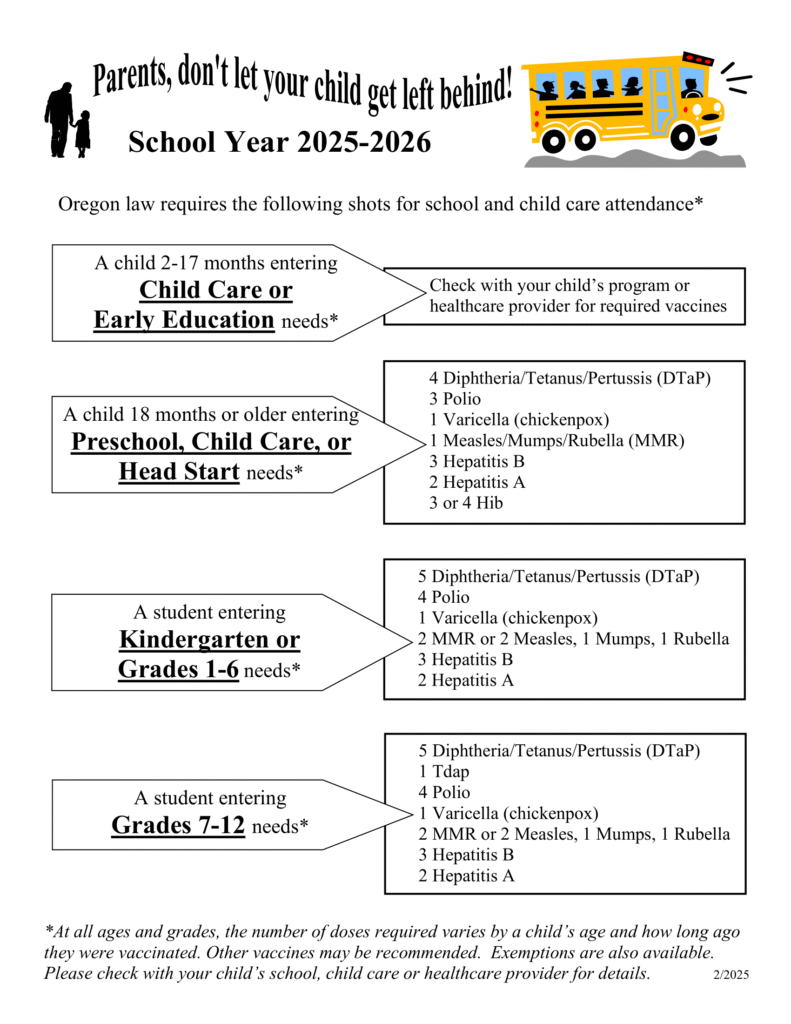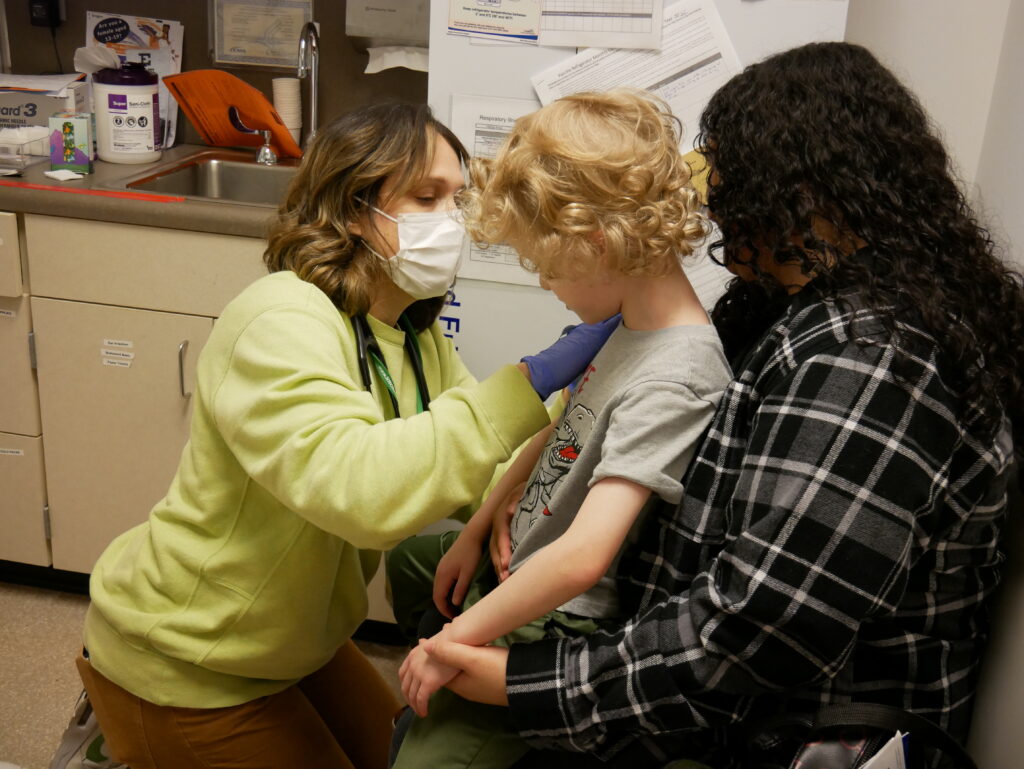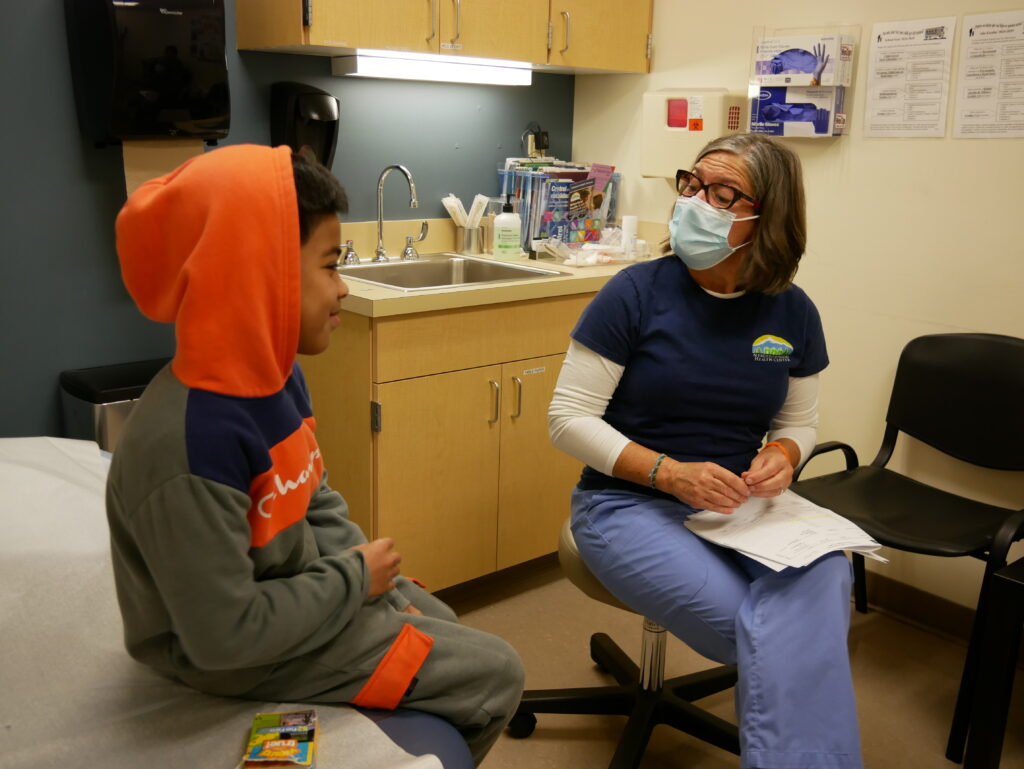What Kids Need to Stay Healthy This Year
As summer winds down, families are gearing up for a new school year. Back-to-school season means shopping for school supplies and adjusting to new routines. It’s also the perfect time to make sure your child is up to date on their health needs.
Vaccinations, sports physicals, and wellness visits all play a big role in protecting your child's health and helping them succeed in school. Oregon has specific health requirements for students, and parents need to know which vaccines and check-ups are important for their children.
What Oregon Requires for School Attendance
Vaccinations help protect students, teachers, and the entire school community from preventable illnesses. In Oregon, children must be up to date on required immunizations to attend school.
Did you know? Oregon has an Exclusion Day in February. If a child doesn’t meet vaccine requirements, they could be excluded from school on that day. If they provide updated records or an approved exemption, they will be allowed to remain in school.
Oregon's Required Vaccinations by Age Group
Wondering how many vaccine doses your child needs for school? The chart below shows the total number of vaccine doses children are required to have by age or grade group. That means if your child has already received some of these shots, they may just need a few more to catch up. For example, if your child has had 4 doses of DTaP (diphtheria, tetanus, and pertussis), they’ll only need one more to meet the kindergarten requirement of 5 total doses.

*The vaccinations listed are required for the 2025-2026 school year. The number of doses required varies by a child’s age and the time elapsed since their last vaccination. Other vaccines may be recommended. Exemptions are available. For more information, please visit the Oregon Health Authority. Or, chat with your healthcare provider for more details.
Why Do Kids Need More Shots as They Get Older?
Some vaccines need more than one dose to fully protect your child. As your child grows, they may need booster shots to stay protected and meet the school's vaccine requirements.
Here’s how it works:
- Vaccine series: Some vaccines are given in multiple doses to build long-lasting protection.
- Boosters: A booster dose “reminds” the immune system how to fight off certain illnesses.
- Grade-level requirements: The number of shots your child needs can change as they get older.
Optional vaccines — like HPV (for cancer prevention) and Meningococcal (to prevent meningitis) — are highly recommended for preteens and teens, even if they aren’t required by schools. Talk to your provider about when your child should get these important vaccines.
Wellness Visits & Sports Physicals
Most children have an annual wellness visit around their birthday. This is a chance to check your child’s growth, development, and overall health. These visits are also the perfect time to ask your provider questions about nutrition, sleep habits, or emotional well-being.
If your child plans to join a sports team or participate in athletic activities, they may also need a sports physical. A sports physical checks things like heart health, joints, vision, and injury history to ensure it’s safe for your child to participate.
Learn more about sports physicals

Where to Get Vaccines or Check-Ups
- School-based Health Centers (SBHCs): Offering vaccines and wellness visits at little to no cost for students.
- Primary care providers: Your child’s provider can handle required vaccines and wellness visits.
- Community vaccine clinics: Some provide free or low-cost vaccinations.
Not sure if your child is up to date? Contact their school or provider to review immunization records.
Related: Ask a Provider about how to support your child during vaccine appointments
Healthy Habits for a Successful School Year
Beyond vaccines and physicals, daily habits play a big role in keeping kids healthy and focused.
Reestablish Sleep Routines
- Start transitioning to consistent bedtimes and wake-up schedules at least two weeks before school starts.
- Children and teenagers should aim for 8-10 hours of sleep each night for improved focus and mood.
Eat Balanced Meals & Snacks
- Pack nutrient-rich lunches with fruits, veggies, lean proteins, and whole grains.
- Encourage kids to drink water instead of sugary drinks.
Practice Good Hygiene
- Teach kids to wash their hands frequently to prevent illness.
- Remind them to cover coughs and sneezes and avoid touching their face.
Know When to Keep Kids Home
- If your child has a fever, flu-like symptoms, vomiting, or diarrhea, they should stay home. Once they are symptom-free for at least 24 hours, consider sending them back to school.

How NHC Can Help
Neighborhood Health Center offers:
- Vaccinations at our School-based Health Centers.
- Wellness visits to keep kids on track.
- Sports physicals for student-athletes.
- Affordable care, with options for families without insurance.
Start the school year strong. Schedule your child’s wellness visit or vaccines today!
References
- Oregon Health Authority. School Required Immunizations. https://www.oregon.gov/oha/ph/preventionwellness/vaccinesimmunization/gettingimmunized/pages/schrequiredimm.aspx
- Oregon Secretary of State. Oregon Administrative Rules – Immunization Requirements. https://secure.sos.state.or.us/oard/displayDivisionRules.action?selectedDivision=1265
- Crook County Health Department. Vaccination Schedules & School Exclusion. https://co.crook.or.us/health/page/vaccination-schedules-school-exclusion
- Oregon State University Student Health Services. Immunizations. https://studenthealth.oregonstate.edu/immunizations
- Centers for Disease Control and Prevention (CDC) – Child and Adolescent Immunization Schedule, United States, 2024.
https://www.cdc.gov/vaccines/schedules/index.html - Oregon Administrative Rules – Immunization Requirements for Schools, Preschools, and Child Care Facilities.
https://secure.sos.state.or.us/oard/displayDivisionRules.action?selectedDivision=1265

Kristen Weidner, SBHC Clinic Manager
This article was reviewed by Kristen Weidner, SBHC Clinic Manager at Neighborhood Health Center. Kristen oversees daily operations at NHC’s school-based health centers, ensuring students receive compassionate, coordinated care in a welcoming environment. With a focus on collaboration, quality, and continuous improvement, Kristen helps lead efforts that make care more accessible and impactful for youth and families in our community.